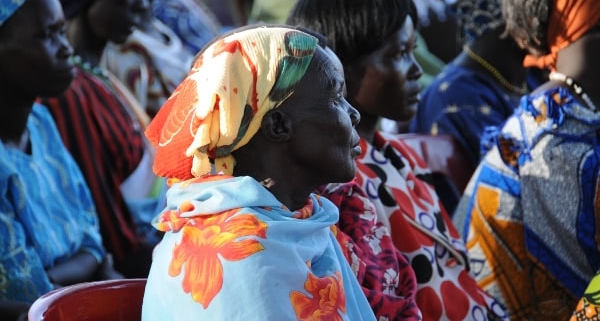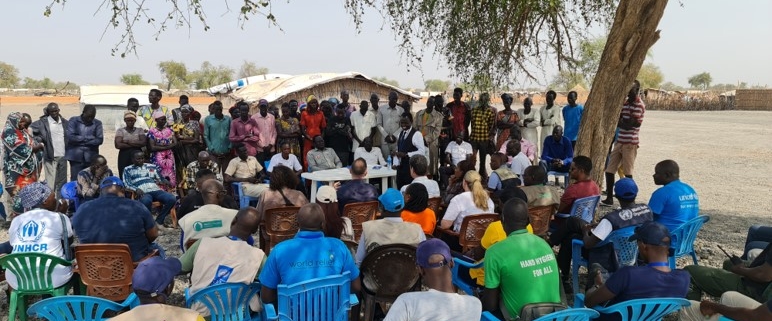This CSRF report focuses on the return and reintegration resulting from the current influx of returnees and refugees from Sudan and other neighbouring countries. Specifically, the report explores the risks associated with return and reintegration as well as opportunities for conflict sensitive reintegration and durable solutions initiatives. To inform the current approaches to returns and reintegration, the report highlights key lessons from past returns and reintegration experiences in South (ern) Sudan.
About CSRF
The Conflict Sensitivity Resource Facility (CSRF), initiated in 2016, supports the use of conflict sensitivity in donor strategies and programmes in South Sudan.
Entries by CSRF
Women in South Sudan are subject to limited access to political, economic, social resources due to the country’s rigid patriarchal structure. Nevertheless, women have been negotiating their agency and influence for decades, playing a crucial role in state-building, peacebuilding, and development processes. Beyond their formal role as agents of peace, considering the informal dimensions through which South Sudanese women influence peace and conflict are vastly significant for aid actors to grasp conflict dynamics and the…
This blog by Sean McGovern and Abraham Diing Akoi, is based on a recently published research report on social media and violence. The blog explores the intersection between the use of social media, including WhatsApp, in times of conflict and violence. Using the case of South Sudan, the blog identifies how communities have used WhatsApp in both positive and negative ways during conflict. The blog provides some recommendations on how to mitigate the detrimental effects…
This meta-analysis offers an overview of the literature on governance in South Sudan in the CSRF repository by exploring salient and timely questions for donor-funded programming. These questions focus on the reason why local governance structures differ in South Sudan and the implications for aid actors; the relations between national, state, and local governance institutions and the implications for state building endeavours; the impacts of conflict and food security induced displacement on governance and the…
Focusing on peace in South Sudan, this meta-analysis provides an overview of the literature available on formal peace agreements – their limitation and challenges, local level conflict prevention and resolution mechanisms, and disarmament, demobilisation, and reintegration (DDR) processes in South Sudan. Specifically, it explores the structural limitation and implementation challenges of the formal peace agreements and their legacy, as well as looking particularly at the DDR processes envisaged as parts of these agreements. Finally, it…
In this blog, Lona Elia Morgan and Livia Oliver discuss the concept of gender and conflicting perceptions of the concept among South Sudanese communities. Based on their extensive gender work, they explore different perceptions around gender and the related impact on conflict dynamics, as well as on aid programming, providing insights on how aid actors can change these perceptions and mitigate risks on aid interventions. In South Sudan, gender sensitivity is increasingly being integrated…
This briefing provides field-based reflections and Conflict Sensitivity Lessons of the Partnership for Peace, Recovery and Resilience (PfPRR) in Rubkona, Leer & Mayendit, South Sudan. The reflections build on the CSRF’s accompaniment to PfPRR stakeholders in Rubkona/Bentiu and point at some key lessons learned, including the significance of the PFPRR as platform for collaboration, the importance of leadership at all levels, increased ownership by the involved agencies and that greater inclusiveness should be encouraged.
This analysis provides a snapshot on the diverse role of chiefs in development, humanitarian, and peacebuilding engagements in South Sudan. It highlights their prominent role in local governance, service delivery, community mobilisation, allocation of resources, etc., and thus showcasing the need for aid actors to better understand their role and interaction with aid provision. Lastly, the analysis piece provides a set of concrete recommendations for aid workers and peacebuilders in the interaction with these actors.
Focusing on gender in South Sudan, this meta-analysis provides an overview of the literature available on gender dynamics with a special attention on women. It looks at their role in politics and peacebuilding, conflict related sexual violence (CRSV) and sexual and gender-based violence (SGBV), and explores the changing roles of women in times of conflict. The analysis concludes with a brief assessment of gendered access to education and its evolution over time.
The ‘Triple Nexus’: Where the humanitarian, development and peace sectors work together to make the most of their comparative advantages to enable a more coherent, efficient and collective response to global challenges. This is an attractive prospect in South Sudan, which continues to experience a range of interconnected crises and shocks that cannot be addressed in isolation. Donors and organisations at all levels therefore proactively engage each other to share information and knowledge, ensure better…
Some Infos
Lorem ipsum dolor sit amet, consectetuer adipiscing elit. Aenean commodo ligula eget dolor.
Pages
- About Our County Profiles
- Blog
- Case Studies Grid
- Central Equatoria
- Conflict Sensitivity Resource Facility South Sudan
- Contact Us
- Contribute a Repository Article
- County Profile HTML links
- County Profiles
- COVID-19 HUB
- Covid-19 information page
- CSRF About Us
- CSRF Helpdesk
- CSRF Helpdesk Form
- CSRF Login
- Dashboard
- Deliverables
- Demo
- Events
- Forgot password
- Guides, Tools and Checklists
- Helpdesk
- Home
- Latest
- Looker Studio
- Subscribe



